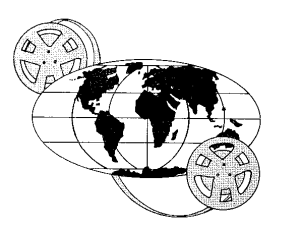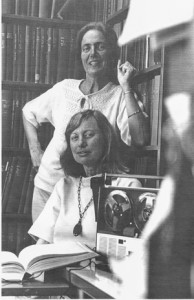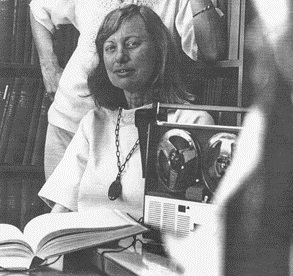Follow our weekly series, Throwback Thursday, designed to help celebrate 50 years of OHA. We’ll profile a year in the life of the organization each week with photos, logos, and highlights taken from the Oral History Association Newsletter. We welcome your memories, photos, and comments at oha@gsu.edu.
OHA in 1969 — a new logo debuts!

President: Gould Colman, Cornell University
Site of the Annual Colloquium: Airlie House in Warrenton, Virginia
Newsletter: Charles T. Morrissey, Editor; Samuel Hand, Associate Editor
Editorial office located at the Vermont Historical Society in Montpelier, Vermont
Annual individual membership: $7.50
Highlights of the year from the Oral History Newsletter:
- OHA adopts a statement on goals and guidelines for oral history interviewing. “Because the scholarly community is involved in both the production and use of oral history, the Association recognizes an opportunity and an obligation on the part of all concerned to make this type of historical source as authentic and useful as possible.” (Vol III, No. 1)
- Secondary School Oral History Committee pursues idea of recording interviews as a teaching tool. Members of this committee invite suggestions about student-recorded oral history interviews and interviews for classroom use that would assist students in understanding how historical information is obtained.
- Nuala McGann Drescher, Associate Professor at the State University College at Buffalo, presented a paper at the first annual Pacific Labor History conference. She said she is “absolutely hooked” on oral history as a source method for the labor historian. She explains that “aspects that do not come out under the ‘great man’ approach are the rank-and file attitudes, the reactions of the ordinary man to these key decisions… Only the interview technique used “with the unpolished, inarticulate, sometimes illiterate, now aging member of the local” will illicit the intangible information that is so valuable. (Vol. III, No. 2)
- The Regional Oral History Office at University of California, Berkeley, begins a new oral history project entitled “The Earl Warren Era in California,” a five-year project focusing on important political and judicial events in California between 1925 and 1953, emphasizing the “Earl Warren era,” when the attitudes and philosophy of one of California’s most famous citizens were being formed.
- Louis Starr of Columbia’s Oral History Research Office and first OHA President produced these facts and figures about Oral History Colloquia, 1966-1968: To date, a total of 289 persons (repeaters included) have registered for the three Oral History Colloquia held since 1966. 41 of the 50 states have been represented. California was far in the lead with 63 registrants, followed by New York (38); the District of Columbia (18); and Massachusetts (10).
Who where we interviewing in 1969?
- The U.S. Army Military History Research Collection at Carlisle Barracks, Pennsylvania — oral history interviews with the 8,000 remaining veterans of the Spanish-American War, the Philippine Insurrection, and the Boxer Rebellion.
- Alaska Division of State Libraries — an oral history project for recording Tlingit Indian stories in the native language, with translations, in the village of Kake in Alaska.
- The Department of Anthropology at the University of Arizona — the personal histories of thousands of Indians with the support of a grant of $109,000 from the Doris Duke Foundation. These tape-recorded interviews preserve the memories of the oldest members of several tribes—Apache, Papago, Rio Grande Pueblo, Acoma, Tavapai, Walapai, Lower Pima, Chontal (Mexico), Navajo, and Yaqui.
- International Business Machines, Inc. (IBM) – an oral history project interviewing more than 100 persons involved in the development of computer technology.
- Professor Vincent Harding of the Martin Luther King Center in Atlanta, Georgia — an oral history project that will begin with members of Dr. King’s family and then branch out to include leaders of the Southern Christian Leadership Conference and the civil rights movement general.
- West Virginia University Library, “Oral History in West Virginia: Coal Miners Have Put Their Memories on Tape” — interviews with 73 retired coal miners in West Virginia. The interviews were primarily recorded because company executives, railroad officials, and others involved in West Virginia mining were reluctant to allow historians to conduct their records, thus prohibiting scholars from studying the industry from its basic source materials. Moreover, the interviewers discovered that “the memory of the coal miner itself yields a storehouse of information and impressions that cannot be obtained elsewhere.”

Willa Baum (seated), director of the Regional Oral History Office at Berkeley, and Gaby Morris worked on the Earl Warren Era project.
Check back next Thursday for highlights of 1970…
